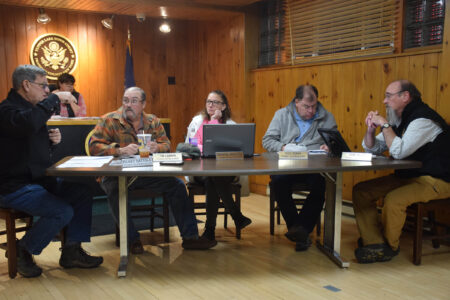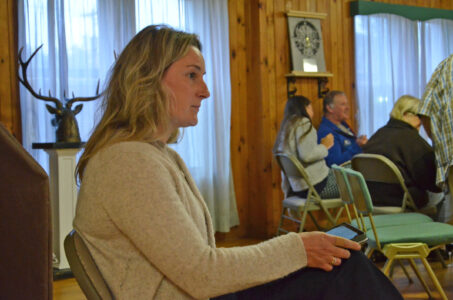Harrietstown budget passes 4-1
Budget under tax cap, includes debated 56% salary increase for supervisor
SARANAC LAKE — The Harrietstown council passed its $6.9 million budget for 2025 in a 4-1 vote on Thursday night, after heated debate about a 56% salary increase for the supervisor.
The budget is well below the state-imposed tax cap. Its main single increase is in the fire protection contract the town has with the village. The budget also includes a $11,669 raise for the town supervisor. The supervisor’s position is currently $20,831 annually. The salary will now be for $32,500, a 56% increase.
The budget was approved in a 4-1 vote. Councilman Johnny Williams cast the one “no” vote. He was also the lone vote against the preliminary budget. Williams was highly impressed and supportive of the budget as a whole but voted no on both because he felt they lacked clarity on the supervisor’s salary in the future.
–
The budget
–
The town expects to spend $6,895,744 in the coming year — a $164,630 or 2.45% increase from the current year’s $6.7 million budget.
The budget includes a $2.8 million tax levy to fund town operations in the coming year. This levy is $85,310 higher than last year, an increase of 3.1%.
The state-imposed tax cap, which limits how much the town can increase its draw from taxpayers from year to year, is set at $2,851,531 for Harrietstown this year, or an allowable 1.001% increase. The tax levy is $14,682 under the cap.
“I think given the current economy, given … what’s happening in the communities and towns around us, when we talk about being good custodians of taxpayer dollars, I can say with a lot of confidence that this town board has worked hard to put together a budget that is very much being a good custodian of taxpayer dollars,” Town Supervisor Jordanna Mallach said.
“Hat’s off,” Williams said to the budget’s creators.
The tax rate for someone living in the town — as well as the village of Saranac Lake — will be $2.01 per $1,000 of assessed value, not including taxes for any additional water or sewer districts. This is a 1-cent increase.
The tax rate for someone living in the town, outside the village, will be $3.66 per $1,000 of assessed value on a home. This does not include taxes for any additional water or sewer districts. This is a 10-cent increase.
For a person with a home assessed at $300,000 in the town and in the village, this will be a base tax rate of $603 — $4.38 more than last year.
For those with a home assessed at $300,000 in the town outside of the village, this will be a base tax rate of $1,098 — $31 more than last year.
The town is projecting $3.44 million in revenue, less than the $3.45 million in expected revenue for the current year.
To supplement the tax levy and other revenues, the town plans to pull $623,600 from its reserves for 2025. The town pulled $528,600 from its reserves for this year’s budget.
–
The raise
–
Williams previously said he didn’t oppose the pay raise for Mallach, since she’s put in a lot of work for the town. His concern was about if this position should be permanently paid more, even if future supervisors are not doing the same work. He said he had asked to make this a temporary raise, but that was not done. Williams said he would’ve felt different if this was a merit-based raise for Mallach rather than a position-based raise.
Jim Murnane, a former Harrietstown councilmember, asked other council members why they voted for an “enormous” raise for the supervisor.
Councilwoman Tracey Schrader said, for her, the raise wasn’t about Mallach; it was about access to the supervisor position — making it so working-class people could afford to throw their hat in the ring.
She also said, that while the job is what the supervisor makes of it, there are a lot of responsibilities for the head of the town right now, especially at the town-owned Adirondack Regional Airport in Lake Clear.
“This is not a part-time job anymore,” Schrader said.
She also felt the increase is a small dollar amount in the context of the whole budget. Councilman Jeremy Evans said the salary is 0.15% of the whole budget.
But despite its small size, he’s had a hard time with this issue, has felt conflicted about it and still doesn’t know what to think.
Evans voted “yes” on the budget because he believes no one will ever have a budget they’ll all agree on and he overall felt good about it. Plus, he pointed out, the supervisor’s salary is actually set in January. The budget just sets aside the money. It doesn’t set the salary itself.
Still, he would have preferred to do this at a different time.
“Normally, when you make this kind of adjustment, you do it at the end of a term,” Evans said.
Mallach’s term as supervisor lasts until December 2025.
Councilwoman Ashley Milne supports everything with the budget, including the salary increase. Though Murnane pushed for a more detailed answer, Milne said she didn’t want to say “why” she supported it all. Later, she said she chose not to because of the tension in the room. She felt whatever she said would not have been productive.
“This is a bad joke,” Murnane said. “When did we ever lack for supervisor candidates?”
He listed a number of previous supervisors.
“They all made it work,” he said.
Schrader said there’s not a lack of candidates, but a lack of different types of candidates from different income levels.
Milne said she could never run for the position with the way things are now, because it would cost more for someone to watch her children than she could afford.
“Is that fair to me?” she asked.
Mallach said she is privileged enough to be able to afford to hold the office. Her health insurance is provided through the Vermont Army National Guard and her husband runs a successful contracting business.
“If I was still a single mom … there is no way I ever would have been able to run for town supervisor because I would have had to choose between paying my bills and serving in this job,” Mallach said.
She said she believes in representative government.
“I think that the salary was kept artificially low as a means to ensure that the people who ran for office came from a certain segment of our society,” Mallach said.
This statement caused a stir in the audience among Murnane and Ron Keough — both former town board members.
Murnane said he didn’t buy this.
“This is the latest made-up reason for you to get a raise, which you clearly want,” Murnane told Mallach.
He has attended budget hearings in the past few years to oppose previous proposed raises.
The debate on Thursday got heated at points, with Murnane and some board members shouting, interrupting, being sarcastic and leveling personal insults.
“You know what Jim? I find that you are rude,” Schrader said at one point.
Schrader said Mallach has “out-performed” past supervisors she’s worked with. Murnane added that Mallach does a good job, but he feels the raise is wrong in the middle of a term
“Is this good government?” he asked. “Is this kind of raise, in the middle of somebody’s term, good government?”
Keough, a former Harrietstown supervisor for 10 years and councilman for 20 years, said he was concerned about locking the salary in. A future supervisor might be a do-nothing, and collect the salary without putting in the work to deserve it for three years. He suggested a ranged salary.
Keough also said the public service on the board has been considered by many to be a donation of sorts to the community.
Schrader said that’s great if you can afford it, but not everyone can.
For the past two years, Mallach had requested an additional $20,000 in pay, but neither raises were finalized.
In past years, Mallach had said she requested the increase because she was putting in full-time hours at the town and saving the taxpayers a lot of money. A large enough contingent of taxpayers and council members who felt the supervisor job did not need to be a full-time job and therefore did not need full-time pay, voiced their opposition.
The debate came down to whether the supervisor position was a full-time job or not. The board was divided at the time, though everyone said Mallach worked hard.
In the first year, some did not want to make the pay a permanent thing.
In the second year, the raise would have been a one-time thing for extra work at the town-owned airport.
The budget also carries $211 raises for the four council members, taking their annual salaries from $7,022 each to $7,233 each. That comes to a total of $844 more than last year, cumulatively.
–
Other budget items
–
“The single biggest increase to our budget is the fire contract,” Mallach said.
Harrietstown pays 59.45% of the fire department budget which is between three towns and the village of Saranac Lake. The portion each pays into the department is based on an assessment of property values covered by the department. Mallach said the town having a 70% equalization rate also has an additional impact in that higher cost.
The primary reason for the increase is a new equipment reserve the village set up. The town has agreed to pay $150,000 into this reserve each year.
This budget also has a change where the town will pay into the contract based on actual expenditures from the previous year, instead of projections for the future year. Mallach said this will likely lead to more fluctuation in the contribution each year, but more accurate numbers. In years past, town Accountant Beth Bevilacqua recently found, when actual expenditures fell below projected levels, the town was paying on average $100,000 to $200,000 into the village reserve each year.
Mallach also clarified that the town won’t pay into the combined emergency services building the village is planning on building for the fire, ambulance and police departments, since capital improvements are not part of the fire protection contract.
Union employees are contracted to get a $0.65 per-hour increase this year. Non-union employees are set to get a 3% pay increase.
The budget also sets aside money to apply for a grant for a housing assessment study.
The town has put additional money in professional services for the airport as it addresses a PFAS contamination issue. The town-owned airport has almost $1.9 million in its unrestricted fund balance and around $276,000 in its restricted fund balance. The airport has almost $17 million in assets.
The town also has additional money put into its assessment department as it works to update its tax equalization rate from 73% to 100% through reevaluation of all town properties, and money into the town laws to make the online zoning code available in a searchable format.
Similar to last year, there’s also additional money included for upgrade work on the town hall and the municipal park on John Munn Road.
The town has approximately $1.2 million in its general fund balances, with around $745,000 in other reserves for things like water, sewer, highway, fire protection and special grants.




